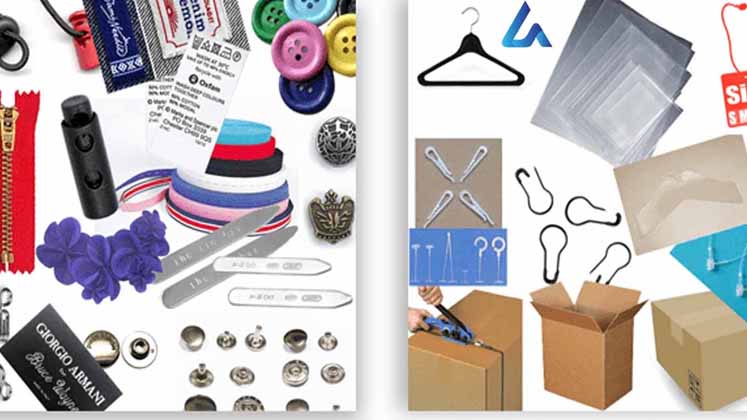
Amid all the focus on the readymade garment industry, other sectors closely associated with it,at times fail to grab much attention.
Take for example the accessories manufacturers, who have strived and toiled over the years to come of age today so much so that Bangladesh, which was once dependent on overseas destinations like China, Taiwan, India, etc., has attained the much-needed self-sufficiency when it comes to accessories.
“With the development of the local accessories and packaging industry, our apparel sector has become self-reliant,” proudly claims Shahidullah Azim, the Vice-President of the apex garment makers’ body, the Bangladesh Garment Manufacturers and Exporters Association (BGMEA).
As per Shahidullah around 80 per cent to 85 per cent of the demand is now met from the local accessories and packaging industry, who attributed the industry’s lead time improvement to local availability of accessories. “…it helped reduce both cost and lead time,” said the BGMEA Vice-President, praising the quality of locally made accessory items.
“Business is on the upswing for accessories for quite some time now. We think the market will continue to be on positive growth as garments industry overall has good order volumes,” underlines Debasis Daspal, CEO, KDS Accessories Ltd.,on the existing scenario for the accessory makers.
KDS Accessories has several plus to ride this growth wave, feels the CEO.
It has established itself as a truly one-stop trims solution provider for garments sector. Apart from having several accessories production under one roof, it has factories in different locations in the country. Besides. it’s superior online-based customer service makes it a favourable supplier too.
As per reports, currently there are more than 1800 garment accessories and packaging manufacturers across Bangladesh who churn out more than 30 garments accessories and packaging items including polybags, hangers, elastic straps, buttons, button tags, collar stands, labels, corrugated cartons, zippers, hang tags, backboards, neck boards, sewing threads, price tags, photo boards, gum tapes, tissue tapes, embroidery, padding, quilting and more, meeting almost 90 per cent of the demand of the apparel sector.
Aptly supporting the apparel industry in its growth and development, accessory makers also emerged as major employment generators, providing livelihood to over seven lakh people with a total investment of about Taka 40,000 crore.
The scenario however was starkly different in the 1980s when exporters had to make do with old and used cartons to pack and ship products, mostly imported from other countries and made them fit for use by cutting them manually.
Come the ’90s, things took a turn for the better, after entrepreneurs set up accessories manufacturing units with massive investments, which proved to be a boon for the apparel industry.
“…in 1990, finding good prospects, few patriotic industrialists started accessories and packaging business. During these 30 years, on an average, 59 accessories and packaging units were established per year. Due to support of this sector, Bangladesh is now second globally in terms of apparel manufacturing and exports,” underlines President of the Bangladesh Garments Accessories & Packaging Manufacturers and Exporters Association (BGAPMEA), Mohammad Moazzem Hossain Moti.
Keeping pace with the evolving scenario, many accessory manufacturers have also embraced sustainability in a big way to ensure business growth.
“Bangladesh accessory manufactures have kept pace with international trends including sustainable and ethical practices which has helped the industry become self-reliant and valuable for international business,” says Jamil Ahmed, Managing Director (Bangladesh Operations) of Britannia Garment Packaging.
Apart from international quality and credibility at lesser price and lead times, what really sets this company aside is its working philosophy, which is not buyer-driven, but self-motivated.
Its green manufacturing unit is fully compliant to all the international norms for safety – both worker and building-wise, besides being worker and environment-friendly with open green spaces, ETP, recycling of water for gardening purposes, etc., adding new dimensions to its sustainability endeavours.
It also happens to be the first company in Bangladesh to be ‘100 per cent disable-friendly’, working closely with CDD (Centre for disability and Development) to support greater integration of disabled people in the garment industry.
According to industry insiders, the growth rate in this sector is 10 per cent and after meeting the domestic demand, accessories are also exported to other garment producing countries such as Pakistan, Vietnam and Cambodia although the volume is low even if industry people put the figure of the direct export of accessories at around US $500 million.
“I export a few specialised garment accessories…,” claims Managing Director of Montrims Ltd., Momin Mondol, who shipped accessories to European countries as per buyers’ requirement even as the company exports accessories worth US $ 60 million a year.
Montrims Limited is a local garment accessories maker and a concern of the Mondol Group.
“We are self-sufficient in accessories. We have a lot of prospects in this sector,” asserts Shahadat Hossain Kiron, Chairman of Dekko Legacy Group, a major button producer.
The group’s total exports reportedly stand at US $ 300 million, of which 15 per cent is accessories, mainly labels, buttons, hand tags, price tags, and printed labels.
“Most of the countries stopped production during the spread of COVID-19, so it was impossible to import these items from abroad, so we met the whole demand locally,” underlines another accessory maker adding currently, along with the apparel sector they also supply accessories and packaging products to the pharmaceutical, leather, fruit, crockery and other industries.
The breakout of the pandemic, also had an adverse impact on garment accessory and packaging manufacturers of Bangladesh as well. Subsequent to global supply chain hit by the pandemic, prices of raw materials used by the backward linkage industry skyrocketed.
Says Md. Shabbir Ahmed, Director of NEO Zipper: “One of our major USPs is our flexibility to provide big and small orders. To ensure there is no break in raw material supply which is mostly sourced from China, we keep advance stock of raw materials in the factory. This has proved very critical in these times as supplies have been majorly disrupted. Also, since our port situation is not that good and causes problem with the lead time, we do not take any chances.”
NEO Zipper, though a local manufacturer, has acquired the reputation of a global brand having nominations/approvals from retailers like H&M, Walmart Canada, Meijer US, Regatta-UK, Orchestra and Carrefour (both from France), to name a few.
Meanwhile, speaking to the media, AKM Mustafa Selim, Owner of SAMS Packaging, said along with increase in raw material prices, the accessory manufacturers also had to deal with liquidity crisis as banks refused to give additional loans even if as per BGAPMEA, despite being SMEs, majority of the accessory manufacturers did not receive loans from the Taka 20,000 crore stimulus package announced by the Government.
Things have but started to get back to normal now.However, despite the huge opportunity for the sector to grow in both the local and foreign markets, sector people say many issues remain still. Lack of policy support, tax burdens hampering inflow of investments, and shortage of gas are just to name a few.
Because of a higher price of raw materials caused by import duty, the production cost has gone up manifold, say industry insiders, adding, in the given scenario, local accessories manufacturers, many a times, fail to offer competitive prices vis-à-vis China, which leads apparel manufacturers to choose China over Bangladesh for sourcing accessories.
“…some policies of the Government are needed to develop this industry and untap the potential.
We repeatedly demand to reduce the corporate tax rate to around 10 per cent to 12 per cent like the RMG sector, to halve the tax at the source of export, and to withdraw the existing income tax on the purchase of raw materials for export,” explains Abdul Kader Khan, Managing Director of Khan Accessories and Packaging Company Ltd.and ex-President of the BGAPMEA.
The accessories manufacturers felt left out and deprived in the budget too!
The BGAPMEA expressed its frustration, as their demands for reducing corporate tax and source tax were not reportedly addressed in the budget for fiscal year 2021-22.
“The Government has proposed the budget taking the pandemic into consideration, but we are deprived as usual,”rued the then BGAPMEA President Abdul Kader Khan, adding although the export-import policy mentioned providing equal facilities to both direct and deemed exporters, accessory makers mostly did not get it.
They have thus sought individual industry tag for the sector along with policy and fiscal support.
“Our export target is earmarked US$ 12 billion by the end of 2025 provided Government gives policy support to this sector…,” winds up the current BGAPMEA President on a promising note but with a caveat nevertheless.






